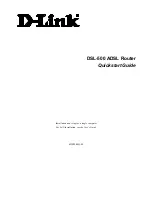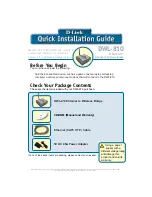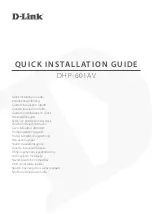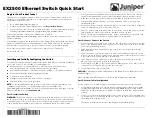
DGS-3700-12/DGS-3700-12G Series Layer 2 Gigabit Ethernet User Manual
210
Figure 8- 19 IMPB Port Settings window
The following fields can be set or modified:
Parameter Description
From Port /To Port
Select a port or range of ports to set for IP-MAC binding.
IPv4 State
Use the pull-down menu to enable or disable these ports for IP-MAC binding for IPv4.
Enabled (Strict)
– This mode provides a stricter method of control. If the user selects this
mode, all packets will be sent to the CPU, thus all packets will not be forwarded by the
hardware until the S/W learns the entries for the ports. The port will check ARP packets and IP
packets by IP-MAC-port binding entries. When the packet is found by the entry, the MAC
address will be set to dynamic state. If the packet is not found by the entry, the MAC address
will be set to block. Other packets will be dropped. The default mode is strict if not specified.
The ports with strict mode will capture unicast DHCP packets through the ACL module. If
configuring IP-MAC binding port enable in strict mode when IP-MAC binding DHCP snooping
is enabled, it will create an ACL profile and the rules according to the ports. If there is not
enough profile or rule space for ACL profile or rule table, it will return a warning message and
will not create ACL profile and rules to capture unicast DHCP packets.
Enabled (Loose)
– This mode provides a looser way of control. If the user selects loose mode,
ARP packets and IP broadcast packets will be sent to the CPU. The packets will still be
forwarded by the hardware until a specific source MAC address is blocked by the software.
The port will check ARP packets and IP broadcast packets by IP-MAC-port binding entries.
When the packet is found by the entry, the MAC address will be set to dynamic state. If the
packet is not found by the entry, the MAC address will be set to block. Other packets will be
bypassed.
IPv6 State
Use the pull-down menu to enable or disable these ports for IP-MAC binding for IPv6.
Enabled (Strict)
– This mode provides a stricter method of control. If the user selects this
mode, all packets will be sent to the CPU, thus all packets will not be forwarded by the
hardware until the S/W learns the entries for the ports. The port will check ARP packets and IP
packets by IP-MAC-port binding entries. When the packet is found by the entry, the MAC
address will be set to dynamic state. If the packet is not found by the entry, the MAC address
will be set to block. Other packets will be dropped. The default mode is strict if not specified.
The ports with strict mode will capture unicast DHCP packets through the ACL module. If
configuring IP-MAC binding port enable in strict mode when IP-MAC binding DHCP snooping
is enabled, it will create an ACL profile and the rules according to the ports. If there is not
enough profile or rule space for ACL profile or rule table, it will return a warning message and
will not create ACL profile and rules to capture unicast DHCP packets.
Enabled (Loose)
– This mode provides a looser way of control. If the user selects loose mode,
ARP packets and IP broadcast packets will be sent to the CPU. The packets will still be
forwarded by the hardware until a specific source MAC address is blocked by the software.
The port will check ARP packets and IP broadcast packets by IP-MAC-port binding entries.
















































